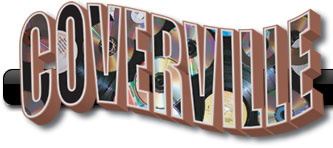It’s not exactly an obscure podcast, and it won’t win me any Indie cred, but it was one of the first I subscribed to and actually listened to on a regular basis: Brian Ibbott’s Coverville.
As the name implies, Coverville is devoted to playing, rating, debating, and otherwise discussing cover songs. A simple idea, really, but one that turns out to have endless permutations: genre-crossing covers (Hayseed Dixie‘s bluegrass AC/DC, for example), famous songs which turn out to be covers of less well-known originals (on episodes called Originalville), covers in different languages (“Lost in Translation”).
Brian’s also created a number of interesting theme shows:
- Cover Stories, devoted to specific artsits (recent favorites for me were the David Bowie Cover Story and the Cure Cover Story parts one and two)
- Degrees of coveration, for example the recent “Eight Degrees of Coveration“
- Genre based shows, like SKAverville and a recent A Cappella series
- Coverville Idol, in which unsigned bands sent in covers of songs released in a specific year
- The Coverville Countdown, an annual event involving listener voting for the greatest covers of all time
Add to the mix the frequent listener request shows, the request line (a phone number you can call to leave an audio comment or request), guest appearances by his wife Tina, son Tristan, and others, and you’ve got a show that builds a solid brand and listener loyalty.
A few minor nits:
- Brian talks a lot. It’s nothing personal – he seems a very nice guy, and it is kind of endearing in an a folksy way – but I do sometimes wish the music/talk ratio was just a bit higher overall.
- The music leans toward soft pop. Brian’s obviously a fan of the late 80s alternative pop scene – folks like Squeeze, Crowded House, XTC, Howard Jones, etc. Nothing wrong with those folks – I actually like them all too – but the show runs light on harder rock, and is virtually without hip-hop. (When hip-hop does show up, it is in genre-crossing covers: like Jonathan Coulton’s Baby Got Back). I’m a child of the 80s myself, but when Brian missed an easy trivia question about Peter Murphy and Bauhaus, it showed me his 80s were different than my 80s.
- It’s sponsor heavy. Brian licenses the music on the show – that is, he pays royalties to songwriters and recording artists through BMI, Ascap, etc. This, plus the show’s huge popularity, means there are often sponsors. I stopped listening to commercial radio years ago to avoid commercials, and I don’t necessarily want to start hearing them in my podcasts. That said, I’ve never paid for Coverville, so I can understand they need to pay the bills – and the sponsorships are generally relevant.
Finally, the show does a great job of keeping updated show notes on the web site, with links to iTunes for specific songs, links to websites of artists featured, and links to Amazon for albums on which songs appeared. Makes it much easier to go back and locate a tune you enjoyed or purchase an album you’d like to hear more of.

